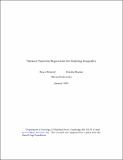| dc.contributor.author | Western, Bruce | |
| dc.contributor.author | Bloom, Deirdre | |
| dc.date.accessioned | 2009-03-10T19:47:50Z | |
| dc.date.issued | 2009-03-10T19:47:50Z | |
| dc.identifier.citation | Western, Bruce and Deirdre Bloome. 2009. Variance function regressions for studying inequality. Working paper, Department of Sociology, Harvard University. | en |
| dc.identifier.uri | http://nrs.harvard.edu/urn-3:HUL.InstRepos:2645469 | |
| dc.description.abstract | Regression-based studies of inequality model only between-group differences, yet often these differences are far exceeded by residual inequality. Residual inequality is usually attributed to measurement error or the influence of unobserved characteristics. We present a regression that includes covariates for both the mean and variance of a dependent variable. In this model, the residual variance is treated as a target for analysis. In analyses of inequality, the residual variance might be interpreted as measuring risk or insecurity. Variance function regressions are illustrated in
an analysis of panel data on earnings among released prisoners in the National
Longitudinal Survey of Youth. We extend the model to a decomposition analysis, relating the change in inequality to compositional changes in the population and changes in coe cients for the mean and variance. The
decomposition is applied to the trend in US earnings inequality among male workers, 1970 to 2005. | en |
| dc.description.sponsorship | Sociology | en |
| dc.language.iso | en_US | en |
| dash.license | OAP | |
| dc.title | Variance Function Regressions for Studying Inequality | en |
| dash.depositing.author | Western, Bruce | |
| dc.identifier.doi | 10.1111/j.1467-9531.2009.01222.x | |
| dash.authorsordered | false | |
| dash.contributor.affiliated | Western, Bruce | |


